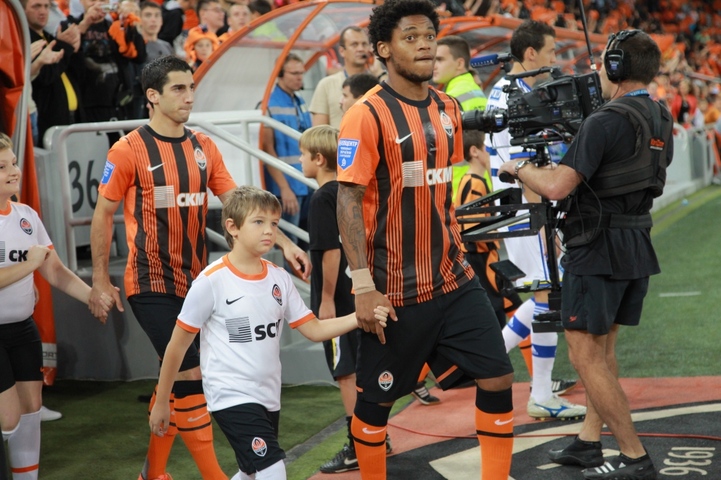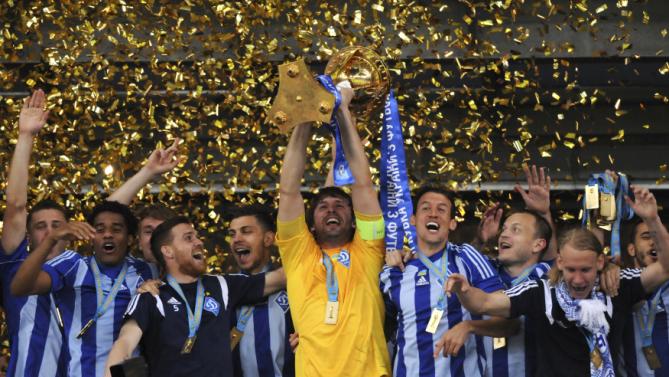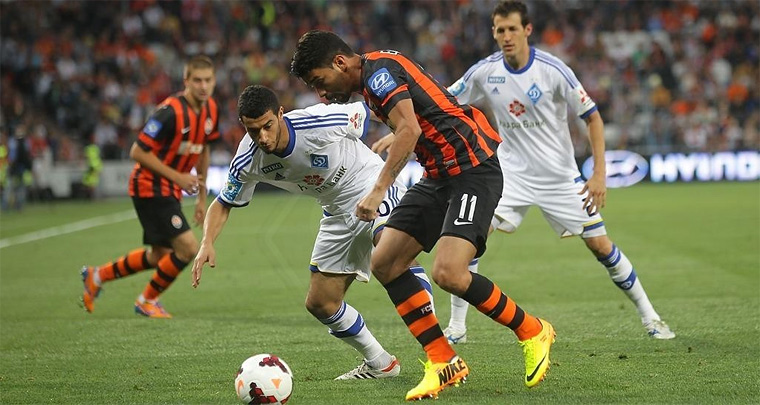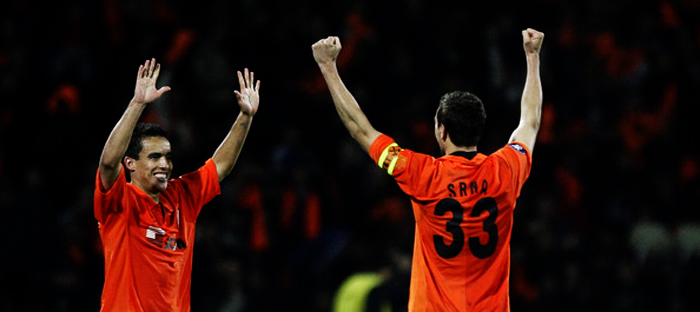By Manuel Veth and Vadim Furmanov –
This Friday evening is the most important fixture in the Ukrainian league calendar. Dynamo will host Shakhtar in what has come to be known as the Ukrainian Derby—the most significant rivalry in Ukrainian football. Shakhtar currently sit three points back of Dynamo, and considering the substantial gap in quality between these two giants and the other teams in the league, there is a distinct possibility that the two matches between them will decide the title.
While the Shakhtar – Dynamo rivalry is currently the strongest in the country, it is a relatively recent one that only became prominent in the late 90s and early 2000s with the emergence of Shakhtar as Dynamo’s only real challenger. There was no animosity between the two sides during the Soviet era, when Dynamo were indisputably the most successful Ukrainian side. Shakhtar, on the other hand, was one of the most popular clubs in the Soviet Union in terms of average attendance, but at the same time the club from the Donbass was also considered a feeder team for Dynamo Kyiv. Dynamo’s biggest rival was Spartak Moscow, and the only rivalry between two Ukrainian sides with historical roots dating back to the Soviet Vysshaya Liga is the one between Metalist and Dnipro.
In the early years of the independent Ukrainian league, Dynamo continued to dominate, and won nine league titles—the only exception was Tavriya Simferopol’s surprising victory in the inaugural season. 1996 was a pivotal year in Ukrainian football in that it was the year Rinat Akhmetov became Shakhtar’s president (by succeeding Akhet Bragin, who was assassinated during a club game) and began to invest heavily in facilities, players, and coaching staff. Results soon followed, and, starting in the 1996-97 season, Shakhtar finished as runner-up four years in a row.
The rise of Shakhtar – the Pivotal Matches
Ukrainian Premier League Return Match
6 March 2002
Shakhtar 2-0 Dynamo
After having lost out on the title by a single point the year before, Shakhtar, in the 2001-02 season, finally got the best of their opponents in what was quickly becoming the leading rivalry in Ukrainian football. With two matches remaining in the season, Dynamo held a two-point advantage when they traveled to Shakhtar expecting to secure their 10th straight title. This time, however, they shot themselves in the foot. In the 43rd minute an own goal from Dynamo defender Serhiy Fedorov gave Shakhtar a 1-0 advantage. Then, in second half stoppage time, Goran Gavrančić scored Dynamo’s second own goal of the match, and Shakhtar won the match 2-0. One week later they clinched their first ever league title with a 1-0 victory over Zakarpattia. Two months later, Shakhtar’s 3-2 victory over Dynamo in the cup final, earned them their first ever domestic double. These matches did not yet signal a shift in the balance of power of Ukrainian football, as Dynamo regained the title the following season. But, it was a sign of things to come.
Ukrainian Cup Final
7 May 2008
Shakhtar 2-0 Dynamo
By the time of the 2008 Ukrainian Cup final, Shakhtar had firmly established themselves not just as a challenger, but instead as a competitor on equal footing with Dynamo. Mirceau Lucescu had been appointed Shakhtar manager in 2004. With Lucescu at the helm, Shakhtar had already added two league titles to their trophy cabinet. This match is the perfect example of the level of intensity to which the rivalry had climbed during the preceding decade. The final was an ill-tempered affair with rash challenges coming from both sides. Referee Viktor Shevtsov completely lost control of the match and sent off five players, four of the penalties were straight reds. This violent encounter set the tone for future meetings between the two sides.
An All-Ukrainian Derby in Europe
2008-09 UEFA Cup Semi-Final
30 April to 7 May 2009
Shakhtar 3-2 Dynamo (On Aggregate)
The UEFA Cup semi-finals in 2009 were, in essence, the competition of two rivalries. While Hamburger SV and Werder Bremen—the two clubs faced each other in both the DFB Cup and the league within a matter of weeks—battled out their supremacy of northern Germany, Shakhtar and Dynamo were drawn together in the second semi-final in what at this point had become the fiercest rivalry in Ukrainian football. The first match for Shakhtar and Dynamo was played on April 30 in Kyiv’s Dynamo Stadium (Lobanovskyi Stadium, named after Valeriy Lobanovskyi). Dmytro Chygrynskiy’s own goal put Dynamo ahead in the 22nd minute. It took Shakhtar until 46 minutes to recover, when Fernandinho was able to equalize the score to make it 1-1. The game shifted backwards and forwards and, really, either team could have been the victor, but in the end the score stood at 1-1 giving Shakhtar the all-important away goal.
The return match was played in Shakhtar’s old stadium, the RSK Olimpiyskiy (the new Donbass Arena was to be opened later that year) an old Soviet style concrete bowl that reflected the socio-political reality in the Donbass much more closely than Akhmetov’s star-studded football project. Shakhtar’s Brazilian legend Jádson—he played 173 matches and scored 41 goals in the six years he played for the club—opened the scoring for Shakhtar. The Guinean striker Ismaël Bangoura equalized the score just after halftime making it 1-1, and more importantly for Dynamo equalized Shakhtar’s away goal. Subsequently the game intensified as Shakhtar realized that a second Dynamo goal would mean that Shakhtar would have to score two, as any extra goal would have given Dynamo the edge on away goals— Shakhtar had to now win the match to go through.
http://www.youtube.com/watch?v=2Fc1QFvNQ4c
The game turned into a battle with each team realizing that their next mistake could be decisive. The game was edging towards extra time when Shakhtar’s Ilsinho received the ball at the edge of the box and, despite being closely shadowed by two Dynamo defenders, broke through and slotted the ball past Dynamo Kyiv keeper Stanislav Bogush.
What happened next is well documented in Jakob Preuss’ fantastic documentary “The Other Chelsea: A Story from Donetsk.” Preuss followed several characters—miners, politicians, and club officials—during Shakhtar’s 2008-09 season, documenting both life in the Donbass and the importance of Shakhtar Donetsk to the region. Preuss’ documentary also records the sentiments of many people living in Donetsk (also just commonly referred to as miners working in the region) who saw Shakhtar’s victory against Dynamo as a victory of the periphery (the Donbass) over the government (Kyiv). These sentiments were also often showcased during league and cup matches between the two teams, but the battle of Ukraine in an international competition such as the UEFA Cup, for the first time, brought a more international awareness to the deep political divides in the country. But more important for Shakhtar supporters, it was their club that moved on to the final in Istanbul, and it was Shakhtar that became the first team from independent Ukraine to win an international trophy.
Shakhtar Dominant
2012-13 Ukrainian Cup Round of 32
23 September 2012
Shakhtar 4-1 Dynamo
It was at this point in the history of the rivalry that Shakhtar eclipsed Dynamo. They had already won three straight league titles in addition to the last two editions of the cup, but if it wasn’t already clear, the Round of 32 tie during the 2012-13 Ukrainian Cup firmly cemented Shakhtar as the undisputed leaders of Ukrainian football and was the low point in Dynamo’s entire history. Shakhtar thoroughly dominated the game and knocked Dynamo out of the competition with a 4-1 victory, an utter embarrassment for the capital club. Immediately following the match, Dynamo sacked its manager, Yuri Semin. It didn’t help; they finished the season seventeen points behind Shakhtar, who strolled their way to a fourth straight league title. Insult was added to injury when Dynamo were knocked out of the top two for the first time in their history, and finished behind runners up Metalist Kharkiv. Dynamo had become a shadow of their former selves, while Shakhtar were getting stronger.

Shakhtar’s Golden Generation – Image via Shakhtar.com
2012-13 Ukrainian Premier League Return Match
7 April 2013
Dynamo Kyiv 1-2 Shakhtar Donetsk
Shakhtar had reached their pinnacle; the club was playing like clockwork and easily dominated the Ukrainian Premier League. Also, in Europe, Shakhtar had become a recognized brand, and they managed a second place finish in a tough Champions League group stage ahead of Chelsea, and behind Juventus. Shakhtar had become one of the most interesting football projects in Europe, and the German magazine 11Freunde even asked, at the time, whether Shakhtar could be a contender for a Champions League title—an objective that had already been officially voiced by Shakhtar officials—including Rinat Akhmetov. Dynamo Kyiv was struggling both on and off the pitch—despite the fact that they had recently moved into the new Olimpiyskiy National Sports Complex, which had been built for the 2012 European Championships. At the time of the derby, Shakhtar were firmly in the driver’s seat to affirm yet another Ukrainian title. On top of that, Shakhtar’s offensive midfielder Henrikh Mkhitaryan was on course to shatter Ukraine’s, most goals of a season record—in the end he scored 25 goals, setting a new record.
Despite Dynamo’s early goal by Andriy Yarmolenko in the 10th minute, Shakhtar was the eventual winner as Mkhitaryan scored two goals, making Shakhtar’s championship all but a certainty. What was even worse for Dynamo was the fact that this defeat would cost the club in the long run, for Dynamo only finished third in the league and thereby missed out on the opportunity to compete in the Champions League.
Dynamo vs. Shakhtar – The Power Shift
2015 Ukrainian Cup Final
4 June 2015
Dynamo 0-0 Shakhtar (5-4 after penalties)

The turning point for Dynamo, as they win the Ukrainian Cup Final in 2015 – Image via uk.sports.yahoo.com
The last Ukrainian Cup Final came weeks after Dynamo finally won the league and broke Shakhtar’s streak of five straight championships. Of course, the 2014-15 season was not a normal one. The war in the Donbass forced Shakhtar to relocate to Lviv, which became their new home away from home. This without a doubt affected their performances, as they played all their matches on the road while Dynamo played many of their ‘away’ matches in Kyiv, as several other exiled teams moved to the capital. Nevertheless, Dynamo had drastically improved under Serhiy Rebrov and went undefeated throughout the whole campaign, so attributing their title entirely to Shakhtar’s exile would be doing them a massive disservice.
The cup final, which presented Dynamo with an opportunity to win their first domestic double since 2007, was a rather dull affair. After a scoreless 120 minutes the match went to penalties, where Shakhtar went up 3-1 after both Miguel Veloso and Vitorino Antunes failed to convert. But Taison and Yaroslav Rakytskiy missed their penalties, and two rounds later Dynamo’s legendary goalkeeper Oleksandr Shovkovksyi saved Oleksandr Hladyi’s attempt, and Dynamo won the cup. This match and the season as a whole were symbolic of a wider power shift occurring in Ukrainian football, but it is still too early to tell whether Dynamo is permanently back on top or if this is a temporary blip in Shakhtar’s streak of domination. Friday’s encounter could provide the answer.
Manuel Veth is a freelance journalist, and PhD candidate at King’s College London. Originally from Munich, Manuel has lived in Amsterdam, Kyiv, Moscow, Tbilisi, London, and currently is located in Victoria BC, Canada. His thesis is entitled: “Selling the People’s Game: Football’s transition from Communism to Capitalism in the Soviet Union and its Successor States”, and will be defended in November. Follow Manuel on Twitter @homosovieticus.
Vadim Furmanov is a recent graduate of the University of Chicago with a Bachelor’s Degree in Political Science. Originally from Ukraine, Vadim has resided in Chicago since 1994 and is a passionate supporter of both Dynamo Kyiv and the Ukrainian national team. He is also a Chicago Fire season ticket holder and a member of the Fire’s Section 8 supporters group. He writes primarily about Ukrainian football, as well as the intersection between football, politics, and history. You can follow Vadim on Twitter @vfurmanov.
Feature Image via 112.ua





















COMMENTS